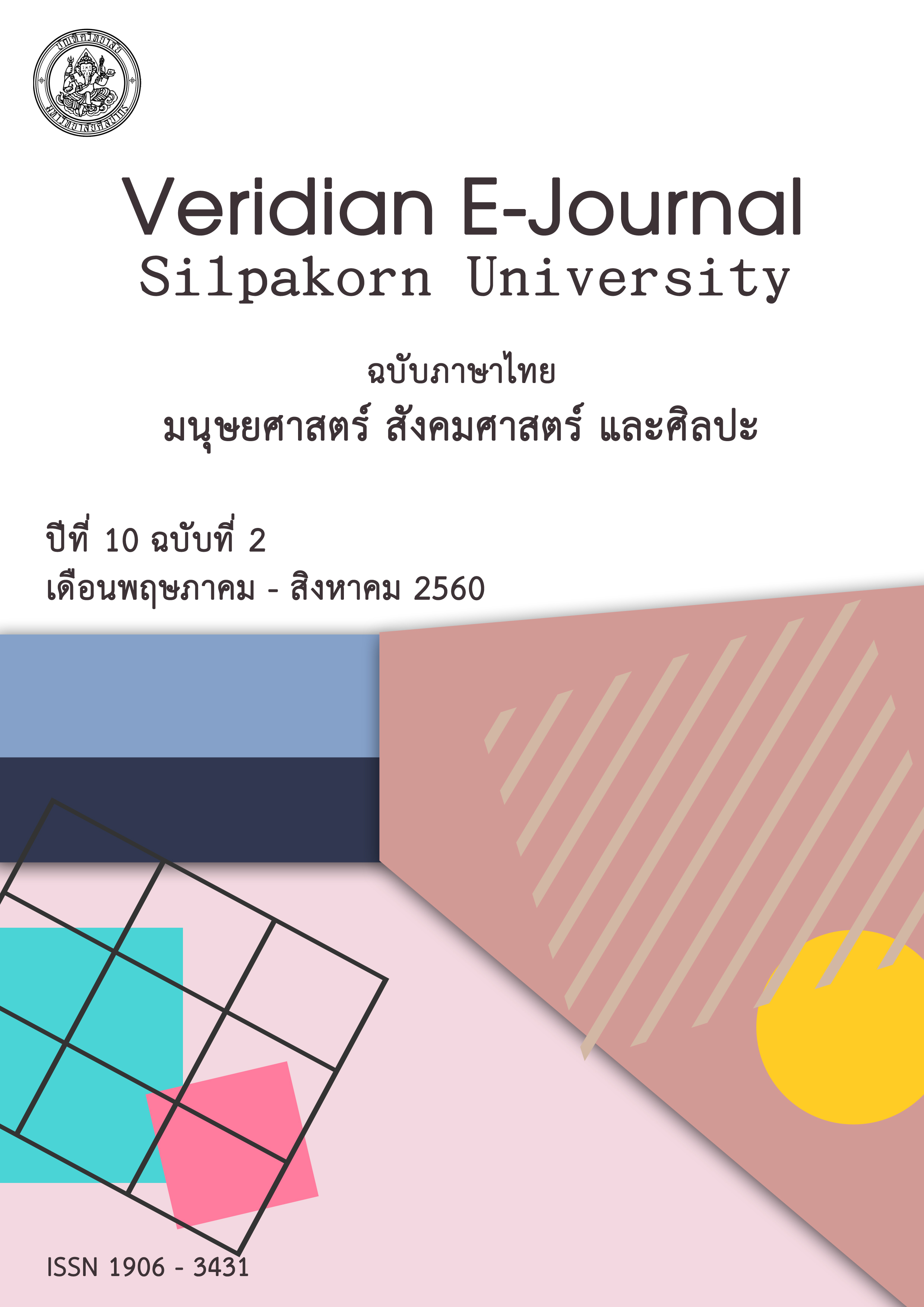วาทกรรมทางการเมืองของพรรคประชาธิปัตย์ระหว่างพ.ศ. 2489 – พ.ศ. 2501
Main Article Content
Abstract
การวิจัยเรื่องวาทกรรมทางการเมืองของพรรคประชาธิปัตย์ระหว่างพ.ศ. 2489 – พ.ศ. 2501 มีวัตถุประสงค์เพื่อศึกษา ค้นหา และวิเคราะห์ กระบวนการสร้างวาทกรรมทางการเมืองของพรรคประชาธิปัตย์ในยุคแห่งการสร้างพรรคและสร้างประชาธิปไตยต่อต้านเผด็จการ (พ.ศ. 2489–พ.ศ. 2501) ด้วยการใช้วิธีการวิจัยเชิงคุณภาพ โดยการวิเคราะห์เนื้อหาและหลักการวิเคราะห์วาทกรรม ตามแนวคิดของ Foucault ทั้งนี้ผู้วิจัยได้เก็บข้อมูลในรูปแบบของตัวบท (text) จากเอกสาร หนังสือ สิ่งพิมพ์และข้อมูลจากอินเทอร์เน็ตที่เกี่ยวข้องกับประวัติศาสตร์การเมืองไทยและพรรคประชาธิปัตย์ ผลการวิจัยพบว่า พรรคประชาธิปัตย์มีกระบวนการสร้างและการให้ความหมายของวาทกรรมทางการเมือง ด้วยการทำให้สังคมเชื่อว่า วาทกรรมทางการเมืองของพรรคในยุคนี้ซึ่งประกอบด้วยวาทกรรมระบอบประชาธิปไตยอันมีพระมหากษัตริย์ทรงเป็นประมุข และ วาทกรรมต่อต้านเผด็จการ ด้วยการสร้างวาทกรรมระบอบประชาธิปไตยอันมีพระมหากษัตริย์ทรงเป็นประมุขเพื่อเสนอให้สังคมรับรู้ถึงความสอดคล้องและเหมาะสมกับบริบททางสังคมและวัฒนธรรมไทย และ การสร้างวาทกรรมต่อต้านเผด็จการเพื่อเสนอให้สังคมรับรู้ถึงรัฐบาลที่ขาดความชอบธรรมด้วยการใช้อำนาจเผด็จการ ริดรอนสิทธิเสรีภาพและการมีส่วนร่วมทางการเมือง ซึ่งไม่เป็นไปตามหลักการปกครองระบอบประชาธิปไตยที่ใช้ในการปกครองประเทศ
พรรคประชาธิปัตย์ใช้อำนาจอันแยบยล และสร้างความชอบธรรมให้แก่วาทกรรมทางการเมืองของพรรค สร้างอุดมการณ์ให้คนในสังคมยอมรับ ยอมตาม เชื่อฟัง และปฏิบัติตามวาทกรรมทางการเมืองที่สร้างขึ้น เพื่อมุ่งไปสู่แนวทางทางการเมืองที่พรรคประชาธิปัตย์วาดหวังไว้ โดยผ่านภาคปฏิบัติการของวาทกรรมที่หลากหลาย และผลิตซ้ำวาทกรรมเหล่านั้น การให้ความหมายวาทกรรมทางการเมือง พบว่า การให้ความหมายมีการเปลี่ยนแปลงให้สอดรับกับบริบทของสังคมและการเมืองในแต่ละช่วงตามสถานการณ์ทางการเมือง และจากความสัมพันธ์เชิงอำนาจในการสร้างวาทกรรมทางการเมือง พรรคประชาธิปัตย์ได้ใช้เป็นเครื่องมือเพื่อสร้างความชอบธรรม ในการส่งผ่านความรู้ อัตลักษณ์ และอุดมการณ์ด้วยความหมายที่สร้างขึ้นในยุคนี้ เพื่อตอกย้ำให้สังคมไทยซึบซับจนเชื่ออย่างสนิทใจ โดยไม่อาจเท่าทันกับเป้าประสงค์หลักของพรรคประชาธิปัตย์ ที่ว่าด้วยการดำรงอยู่และสามารถเป็นผู้ใช้อำนาจทางการเมือง รวมถึงเบียดขับกลุ่มการเมืองฝ่ายตรงข้ามให้พ้นจากสนามการต่อสู้ต่อรองทางการเมืองในที่สุด
Political Discourses of Thai Democrat Party 1946 – 1958 aims to study, find and analyze the political discourse process of Thai Democrat Party in the era of party formation and democracy against authoritarian using the qualitative research method. The content and principles of discourse analysis were based on the Foucault’s concept. The researcher has collected data in the form of text, book, printed materials and information from the Internet related to Thai political history and Thai Democrat Party. The research found that Thai Democrat Party has constructed the process and interpretation of political discourse by making the society believes that the political discourse of this era consists of discourses of democratic form of government with the King as Head of State and anti-authoritarian discourses. Discourses of democratic form of government with the King as Head of State were constructed to make the society aware of its conformity with and appropriate to the Thai social and cultural context. Anti-authoritarian discourses were constructed to make the society aware of lack of legitimacy through the use of dictatorship to ostracize people’s freedom, and political participation, which did not follow democratic principles applied to the country.
Thai Democrat Party exercised its mighty power and legitimized the party's political discourse by creating an ideology for people in the society to accept, obedience, and follow the political discourse constructed to focus on the political direction Thai Democrat Party desired through the operating sector of a variety of discourses and reproduction of those discourses. The meaning of political discourse had changed in accordance with the context of society and politics in each period according to the political situation. Thai Democrat Party had used the power relationship to construct a political discourse as a tool to legitimize the transmission of knowledge, identity and ideology, constructed in this era to reinforce the Thai society to firmly believe, despite the fact that the main objective of Thai Democrat Party being the existence and power of political power, as well as the political opponents of the opposition.
